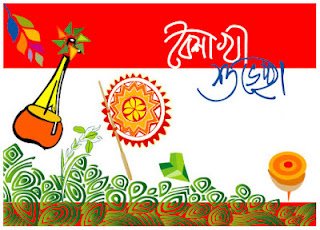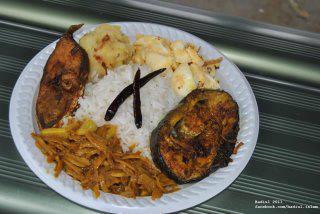
Bengali New Year (Bengali: নববর্ষ Nôbobôrsho) or Poyela Boishakh (পহেলা বৈশাখ Pôhela Boishakh or পয়লা বৈশাখ Pôela Boishakh), occuring on 14th April, is the first day of the Bengali calendar, celebrated in both Bangladesh and West Bengal, and in Bengali communities in Assam, Tripura and Odisha and all over India as well where the Bengali community arises . It coincides with the New Year’s Days of numerous Southern Asian calendars.
In Bengali, Pohela stands for ‘first’ and Baisakh is first month of Bengali calendar.
Poila Boishakh connects all ethnic Bengalis irrespective of religious and regional differences. In India, in West Bengal, Tripura and Assam, it is a public (state) holiday and is publicly celebrated in mid-April. In Bangladesh, it is a national holiday celebrated around 14 April according to the official amended calendar designed by the Bangla Academy.
The festival is celebrated according to the Bengali calendar.
The Bengali calendar is closely tied with the Hindu Vedic solar calendar, based on the Surya Siddhanta. As with many other variants of the Hindu solar calendar, the Bengali calendar commences in mid-April of the Gregorian year. The first day of the Bengali year therefore coincides with the mid-April new year in Mithila, Assam, Burma, Cambodia, Kerala, Manipur, Nepal, Odisha, Punjab, Sri Lanka, Tamil Nadu and Thailand.
King Shoshangko of ancient Bengal, who ruled approximately between 590 CE and 625 CE, is credited with starting the Bengali era.[2] His kingdom encompassed West Bengal, Bangladesh and parts of Bihar, Orissa and Assam. The starting point of the Bengali era is estimated to be on Monday, 12 April 594 in the Julian Calendar and Monday, 14 April 594 in the proleptic Gregorian calendar. The Bengali calendar is derived from the Hindu solar calendar, which is itself based on the Surya Siddhanta.

Under the Mughals, agricultural taxes were collected according to the Hijri calendar. However, as the Hijri calendar is a purely lunar calendar, it does not coincide with the harvest. As a result, farmers were hard-pressed to pay taxes out of season. In order to streamline tax collection, the Mughal Emperor Akbar ordered a reform of the calendar. Accordingly, Fatehullah Shirazi, a renowned scholar and astronomer, formulated the Bengali year on the basis of the Hijri lunar and Hindu solar calendars. The new Fasli San (agricultural year) was introduced on 10/11 March 1584, but was dated from Akbar’s ascension to the throne in 1556. The new year subsequently became known as Bônggabdo or Bengali year.
Celebrations of Pohela Boishakh started from Akbar’s reign. It was customary to clear up all dues on the last day of the year . On the next day, or the first day of the new year, landlords would entertain their tenants with sweets. On this occasion there used to be fairs and other festivities. In due course the occasion became part of domestic and social life, and turned into a day of merriment. The main event of the day was to open a halkhata or new book of accounts.
Source:wikipedia